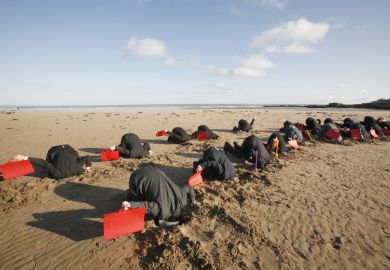Outspoken physicist Peter Ridd has lost an appeal against Queensland’s James Cook University (JCU), in the culmination of a five-year saga in which academics’ intellectual freedom rights have been pitted against rules governing their behaviour.
The High Court has unanimously dismissed Dr Ridd’s appeal against a 2020 Federal Court ruling that upheld his 2018 dismissal.
JCU sacked Dr Ridd after sanctioning him for breaches of the university’s code of conduct and associated policies. They required JCU personnel to treat colleagues with “respect and courtesy”, embrace the “collegial and academic spirit of the search for knowledge” and “behave in a way that upholds the integrity and good reputation of the university”.
Dr Ridd had criticised the university’s coral research for exaggerating damage to the Great Barrier Reef. JCU insisted that it had sacked him not for expressing unpopular views but for disclosing confidential information about the disciplinary processes to external parties including media.
By that stage, Dr Ridd had already instituted legal action against the university for subverting his intellectual freedom through sanctions that included a “no satire direction” and a requirement not to discuss the disciplinary proceedings with his wife.
In 2019 a Federal Court circuit judge ruled in his favour, finding that the termination and 13 other sanctions had breached the university’s enterprise agreement. The judge said that JCU had incorrectly given the code of conduct precedence over an enterprise agreement clause that asserts staff’s intellectual freedom.
“Incredibly, the university has not understood the whole concept of intellectual freedom,” the 2019 judgment says. “It may not always be possible to act collegiately when diametrically opposed views clash in the search for truth.”
The following year, that decision was overturned in a majority ruling of the full Federal Court. It said that the dismissal “had nothing to do with the exercise of intellectual freedom”. Dr Ridd’s actions had “demonstrated a willingness to disobey lawful and reasonable directions…and were destructive of the necessary trust and confidence for the continuation of the employment relationship”.
The latest judgment upholds the 2020 ruling, finding that the enterprise agreement protected intellectual freedom but not “general freedom of speech”. It says that Dr Ridd’s exercise of intellectual freedom was subject to constraints in the enterprise agreement clause, including some that had been “adopted” from the code of conduct.
They included respect for “the legal rights of others” and requirements that disagreements with university decisions be expressed in accordance with “applicable processes”, including confidentiality obligations.
“[The clause] cannot provide any protection against breaches of the code of conduct which…involves a failure to respect the confidentiality of the parties involved, or the confidential information gathered,” the judgment says.
The High Court found that some but not all of JCU’s earlier sanctions against Professor Ridd had been “unjustified”. But his termination had been justified because Dr Ridd had run his legal proceedings “on an all-or-nothing basis”.
In a statement, JCU said that the judgment concluded legal proceedings first initiated by Dr Ridd in 2017 and confirmed that “the termination decision…was justified by 18 grounds of serious misconduct, none of which involved the exercise of intellectual freedom.
“James Cook University at all times has made clear that it strongly supports the pursuit of intellectual enquiry and the freedom of staff to engage in academic and intellectual freedom.”
Former Australian National University academic and transparency advocate Peter Tregear said the judgment was concerning. “I can well foresee universities making all their controversial internal processes explicitly ‘confidential’, thus ensuring that academics cannot speak openly about them,” he said.
“Confidentiality cannot and should not become a means through which universities make their internal operations inscrutable and unaccountable.”
Meanwhile, federal education minister Alan Tudge has announced that all Australian universities now have policies aligning with the model code for protecting freedom of speech and academic freedom, which the government endorsed two years ago.
“This is not going to fix every problem, but it is a very significant step in the right direction,” Mr Tudge said. “Ultimately, what we want to see is viewpoint diversity so that students are challenged with different ideas.
“If universities are not places for free, robust speech, then their very purpose is jeopardised. You cannot advance knowledge without challenging existing orthodoxies, and risk causing offence in the process. Academics who…cannot handle someone challenging their work should not be at a university.”
Register to continue
Why register?
- Registration is free and only takes a moment
- Once registered, you can read 3 articles a month
- Sign up for our newsletter
Subscribe
Or subscribe for unlimited access to:
- Unlimited access to news, views, insights & reviews
- Digital editions
- Digital access to THE’s university and college rankings analysis
Already registered or a current subscriber?








